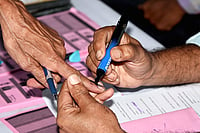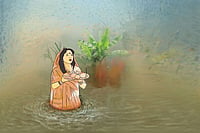Young and Restless
In the summer of 1999, I was young, underconfident and miserable when I landed in New Delhi. I was a ‘star student’ from a small school who had made it to one of the most reputed schools around—Delhi Public School, R.K. Puram. It was a given that I would study science and go on to do either engineering or medicine, as most of us back then did. I did study science but very briefly. Less than a month into the course, I quit. I felt relieved. As if someone had moved a boulder off my chest. I shifted to commerce. Not for the love of accountancy but as a face saver. In my head, in the hierarchy of streams, commerce fell in between science and the humanities. Since I was not studying science, commerce with maths felt more respectable than the humanities. I also felt that I would probably be more employable. In retrospect, I do not think I loved studying commerce either. But I was not miserable either like I was for those few weeks studying Resnick-Hallidays of the world. From commerce, I then switched to law. Maybe it was the restlessness in me that did not let me settle in.
No Maths? I’m In
I chose law not for the love of it either. I knew nothing about it and had no family background in law. I remember reading about law schools in the year 2001, in a magazine that ranked all premier colleges of the country including law schools. There was a piece about the National law School (NLS), Bengaluru calling it the “Harvard of the East.” NLS was also ranked as the number one law school in the country. The only thing that caught my attention in the whole piece and stayed with me was the fact that everyone got placed at the end and were paid a salary of minimum 50K per month. I felt it was too good to be true for a non-science stream. The fact that there was no maths sealed the deal for me. I took the entrance test and landed at Bengaluru for five years of the integrated B.A. LLB course.
A Wealth of Perspective
Thus began my real education whose foundation was built around courses in the liberal arts. The first two years of law school were largely spent studying sociology, political science, history and economics along with a few law subjects. Classrooms were safe and secure. A diversity of views and experiences were encouraged. People with even extremely contrarian views were patiently heard. There were no ideas beyond the realm of questioning or discussion. No issue was taboo. Teachers were, by and large, patient and indulgent. They were not really figures of authority but mostly experienced co-travellers in our educational journey. It was common to question the faculties including the director of the institute in open public forums on various academic and administrative issues of the university.
The place was always buzzing with activity. We learnt as much outside of the classroom as we did inside through informal study circles and discussions on gender, caste, sexuality etc. There were speakers from all walks of life who came to the campus to speak to us. We listened to a wide range of voices. We would agree with some and vigorously disagree with others. But we sat through it all to get an alternative perspective on things. When I write this, I am aware that many who were there may not have had similar experiences or may not feel the same way as I do about the place and its influences on me.
A Changed Man
Five years of legal education opened a new world for me. It fundamentally changed me as a person. As time went by, I discarded many of my old beliefs and prejudices. I had begun to question things around me. My family too, felt that I was changing. From a shy, docile boy, I was turning into a confident man who was not necessarily aligned with the values and beliefs of his immediate ecosystem on issues like gender, identities, caste, religion etc. The liberal arts had encouraged me to ask questions concerning family and society. The vexing and uncomfortable ones. Questioning as a virtue, if it is one, is something that has stayed with me.
I do not necessarily take things for granted. Even as an administrator, I ask many questions. Some to get answers and many to challenge old assumptions, the status quo in hope of better solutions. My lifelong takeaways from the NLS are the ability to empathise, question and be curious. I think this is what a good liberal arts education does: it nudges you to imbibe values and virtues that make for a good citizen and a good human being.
Ashutosh Salil is an IAS officer


























